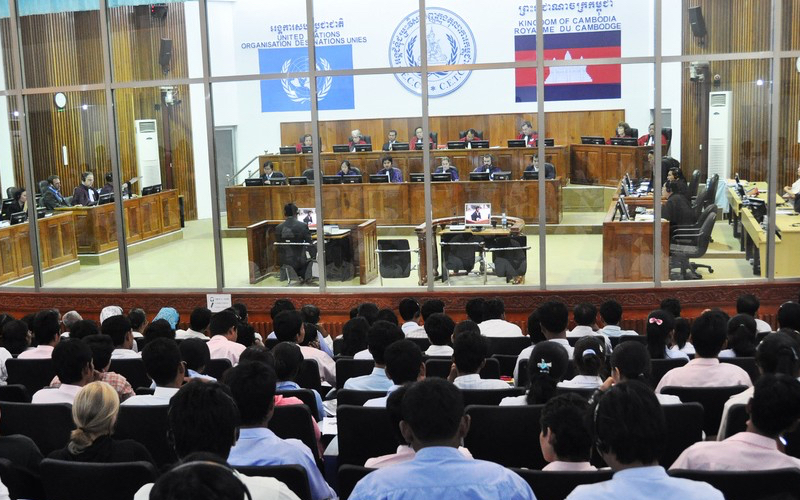
How Independent are International Institutions?
The global political arena is surrounded by international institutions which fulfill different roles and have varying degrees of independence and influence. However, they are not relevant in every international situation as in the case of harmonious situations, where the interests of states are entirely coincident, nor where states’ interests are fully incompatible. Their relevance exists when states have some compatible and some conflicting interests. The relationship between states and international institutions is driven by a transfer of sovereignty from the former to the latter to achieve a common purpose.
David Bosco’s book, Rough Justice, effectively reveals the manner in which a relevant institution like the International Criminal Court struggles to be independent of the influence of a powerful state. The UN and the ECHR provide two other relevant examples of this relationship of interdependence between major powers and institutions.
The ICC is a good example of an international institution in charge of a considerable portion of authority. Bosco states that “The investigation and prosecution of individuals, particularly senior military, political, and security officials, is a sensitive function even for countries with strong and stable domestic institutions. In the context of internal or external conflict, that sensitivity increases markedly. More than a hundred states have given an international body the ultimate say over whether these individuals should be prosecuted.”
In tracing the history of its formation, the initial goal of the ICC was the construction of a trial system inspired by the Nuremberg trials to prosecute future perpetrators of serious crimes. However, the restoration of national sovereignty and the beginning of the Cold War prevented the establishment of such an ambitious international structure.
After abandoning the project in July 1998, the ICC was created. The intention was not only the construction of a tribunal with the aim of punishing excesses during times of conflict, but included broader concepts that involved the prevention of international human rights abuses and the establishment of the rule of law against the rule of force. According to Bosco the ICC was also intended to be a means for the limitation of the power of several influential states through binding law. Bosco writes, “Five decades after Nuremberg, the most powerful states were losing their grip on the mechanisms of international justice.”
An interesting case that outlines the role of the court in international politics is the arrest of the former Chilean president Augusto Pinochet in October 1998, only a few months after the end of the Rome Conference. Pinochet was arrested for the crimes committed during his governorship of Chile from 1973 to 1990. The court applied an infrequently used doctrine which asserts that any state has the right to persecute individuals who have committed serious crimes anywhere in the world. In fact, this principle was previously invoked only to pursue pirates or hijackers operating in the spaces between national jurisdictions. According to Bosco, “The Pinochet prosecution was a much more dramatic gambit, and it set off a diplomatic firestorm.”
The clash of the realities of power politics with the process of achieving international justice is the court’s most pressing aim. Theoretically, the court should avoid being affected by the political influence of powerful states. However, the current international scenario in which the court operates is turbulent and power matters; therefore it is inevitable that the ICC is partially dependent on major powers’ influence. On one hand, the court’s work does not require any formal political input or the approval of countries. It also has the potential to challenge the prerogatives of the powerful states. On the other hand, the court is, like all other international organizations, dependent on state resources. According to Bosco, in the end these influential states and the court were forced to develop a mutual accommodation of each other’s interests, to avoid a failure determined by a possible clash between political power and international justice.
States, however, do not always have a positive inclination towards the court. In fact, the different behavior patterns of powerful states towards the ICC are divided into three alternative strategies according to Bosco. Marginalization, which can be active or passive, consists of control or acceptance. The first strategy is the most common way for the major powers who have not joined the court to ensure a weak and irrelevant relationship with the institution, minimizing the risk of losing their independence. As a matter of fact, an institution out of a powerful state’s control can be inconvenient and even dangerous. Accordingly, the state can decide to obstruct the institution actively by delegitimizing it or through limiting its reach; this would be an active marginalization. They can also choose a less aggressive approach called passive marginalization. For instance, they can merely avoid support and deployment of resources to the institution.
The second strategy seeks to guide and control the court preventing its interference with important state interests. The best way to exercise control over the court is the implicit threat of abandonment of membership if the court does not follow the state’s guideline. Furthermore, for non-members, the most likely mechanism to control the ICC is through the UN Security Council. The Council can use its referral power to express its will and to grant the court additional jurisdictional reach.
The third tactic, acceptance, describes the behavior of states that decide to join the court regardless of whether they can control it. They choose to support the court, evaluating that there would be more benefits than costs of doing so, according to Bosco.
It is interesting to look at the complex relationship between a superpower such as the US and the ICC. Between 2001 and 2005, the United States adopted a policy of active marginalization towards the court. The US tried to attack the court’s moral legitimacy and sought to demonstrate the manner in which the ICC Prosecutor would have unlimited discretion. They stated the relevance of state sovereignty and the possibility to choose between prosecution and national reconciliation. Most of the objections were focused on American legal and institutional concerns which revealed a certain level of hypocrisy, due to US foreign policy initiatives directed at the former Yugoslavian state and Rwanda. Consequently, in 2006, the United States had to abandon this marginalization approach. This policy failure was also a result of the USA’s inability to convince other states to marginalize the court. As Bosco states, “The United States wanted international justice, but only if it could control how it would be applied.”
The United Nations is another useful international institution to examine, regarding its power and independence in the international arena. During the Global Structure Convocation in February 1994, its role was discussed in the post-cold-war era along with its relationship to the US. Divergent opinions emerged from this panel discussion. For instance, Adm. Eugene Carroll stated the importance of the UN and the issues which related to a lack of an effective command and control. He suggested improving the UN military committee and providing the institution with the capability to restrain the international arms trade, as a solution to empower its role of peacekeeping. On the contrary, John Bolton believes that there is no United Nations, just a group of member governments that occasionally have the political will to protect international security.
These are driven by US leadership, and this point was demonstrated by the way the United States behaved during the invasion of South Korea in 1950 and the Gulf War in 1990. Both these cases, according to Bolton, are evidence of the existence of one sole power’s ability to drive the international community. The UN merely follows the US will and there is no possibility that the institution will improve and be more efficient. He also believes that strengthening the UN is useless, as other interlocutors have suggested, since it is one of the most inefficient intergovernmental organizations. It can work only if the United States wants to make it work, otherwise, without US participation, it would be a failure.
The European Court of Human Rights is another institution which has experienced problems asserting its independence. Unlike the institutions mentioned above, the international agendas focused on human rights mostly to regulate the relationship between individuals and their own country, rather than states’ interactions across borders. According to Andrew Moravcsik, “The distinctiveness of such regimes lies instead in their empowerment of individual citizens to bring suit to challenge the domestic activities of their own government.” This mechanism can truly present a challenge to the idea of state sovereignty. In fact, the ECHR independent courts can use the individual’s claim to judge national rules as illegitimate according to international law. Therefore, a real question posed by scholars is why do national governments establish international human rights norms? Realists give an explanation of coercion adopted by major powers, stating that governments accept these constraints because they are forced to do so by their more powerful counterparts. Idealists instead believe that it is a matter of normative persuasion. They assert that the acceptance of international human rights norms by governments is due to their beliefs about the values that underlie them as was suggested by Moravcsik.
There is variability among the interdependent relationships between institutions and powerful states. It is not easy to say precisely how much independence each institution has from the states because there are many factors to take into account, but, as the ICC case has demonstrated, neither is entirely independent. It has also been shown how much influence a great power such as the US can have, even in a central institution like the UN and in particular the case of the ECHR. Therefore, it should be clear that, even if these institutions have a portion of the state’s sovereignty, they cannot escape from the major power’s influence.
